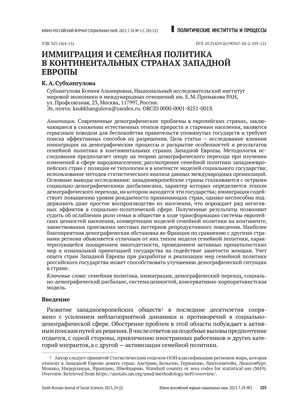Аннотация
Современные демографические проблемы в европейских странах, заключающиеся в снижении естественных темпов прироста и старении населения, являются серьезным поводом для беспокойства правительств упомянутых государств и требуют поиска эффективных способов их разрешения. Цель статьи — исследование влияния иммиграции на демографические процессы и раскрытие особенностей и результатов семейной политики в континентальных странах Западной Европы. Методология исследования предполагает опору на теорию демографического перехода при изучении изменений в сфере народонаселения; рассмотрение семейной политики западноевропейских стран с позиции ее типологии и в контексте моделей социального государства; использование методов статистического анализа данных международных организаций. Основные выводы исследования: западноевропейские страны сталкиваются с острыми социально-демографическими дисбалансами, характер которых определяется этапом демографического перехода, на котором находятся эти государства; иммиграция содействует повышению уровня рождаемости принимающих стран, однако неспособна поддерживать даже простое воспроизводство их населения, что порождает ряд негативных эффектов в социально-политической сфере. Полученные результаты позволяют судить об ослаблении роли семьи в обществе в ходе трансформации системы европейских ценностей населения, конвергенции моделей семейной политики на континенте, заимствовании приезжими местных паттернов репродуктивного поведения. Наиболее благоприятная демографическая обстановка во Франции по сравнению с другими странами региона объясняется отличным от них типом модели семейной политики, характеризующейся поощрением многодетности, проведением активных пронаталистских мер и изначальной ориентацией государства на содействие занятости женщин. Учет опыта стран Западной Европы при разработке и реализации мер семейной политики российского государства может способствовать улучшению демографической ситуации в стране.
Ключевые слова
Библиографические ссылки
Afulani, P.A., Asunka, J. (2015). Socialization, Adaptation, Transnationalism, and the Reproductive Behavior of Sub-Saharan African Migrants in France. K. Joyner, D.F. Warner. (Eds), Population Research and Policy Review, 34, 561–592. DOI: 10.1007/s11113-015-9360-2
Betz, W., Simpson, N.B. (2013). The Effects of International Migration on the Well-being of Native Populations in Europe. IZA Journal of Migratio, 22(12). DOI: 10.1186/2193-9039-2-12
Coleman, D. (2006). Immigration and Ethnic Change in Low-Fertility Countries: A Third Demographic Transition. Population and Development Review, 32(3), 401–446. DOI: 10.1111/j.1728-4457.2006.00131.x
Tsapenko, I. P. (2019). Perspektivnyye tekhnologii integratsii migrantov [Promising Practices of Migrant Integration]. Mirovaya ekonomika i mezhdunarodnyye otnosheniya [World Eсonomy and International Relations], 63(10), 97–108. DOI: 10.20542/0131-2227-2019-63-10-97-108
d’Albis, H., Boubtane, E., Coulibaly, D. (2018). Immigration and Government Spending in OECD Countries. Working paper, 41. Retrieved from https://pjse.hal.science/
Desiderio, R. (2020). The Impact of International Migration on Fertility: An Empirical Study. KNOMAD Paper, 36. World Bank, Washington, DC. Retrieved from https://www.knomad.org/
Dutta, A. (2021). Between Openness and Restriction: German Family Law and Multicultural Challenges. N. Yassari, M.-C. Foblets (Eds), Normativity and Diversity in Family Law, 255–276. DOI: 10.1007/978-3-030-83106-6_11
Esping-Andersen, G. (1990). The Three Worlds of Welfare Capitalism. Princeton University Press.
Fargues, P. (2011). International Migration and the Demographic Transition: A Two-Way Interaction. International Migration Review, 45(3), 588–614. DOI: 10.1111/j.1747-7379.2011.00859.x
Grishin, I.V., Sadovaya, Ye.S., Tsapenko I.P. (Eds). (2020). Sotsial’noe gosudarstvo v zerkale obshchestvennykh transformatsiy [Social State in the Mirror of Social Transformations]. M.: IMEMO, Rossiyskaya akademiya nauk.
Hara, T. (2022). Demographic Sustainability. In J.F. May, J.A. Goldstone (Eds) International Handbook of Population Policies (pp. 759–780). Springer Cham. DOI: 10.1007/978-3-031-02040-7
Hruschka, C. (2020). Hyperactive and Incoherent Legislation and Policy: Germany’s Fragmented Migration Management Within the European Framework. M.-C. Foblets, J.-Y. Carlier (Eds), Law and Migration in a Changing World, 369–407. DOI: 10.1007/978-3-319-99508-3_8
International Migration Outlook. (2022). Paris: OECD Publishing. DOI: 10.1787/30fe16d2-en
Isidro, L., Math, A. (2020). Migrants’ Access to Social Protection in France. In J.-M. Lafleur, D. Vintila (Eds.) Migration and Social Protection in Europe and Beyond, 1, 165–178. DOI: 10.1007/978-3-030-51241-5
Kvashnin, Yu. D. (Eds). (2016). Social’noe gosudarstvo v stranakh ES: proshloe i nastoyashchee [Social State in the EU Countries: Past and Present]. M.: IMEMO, Rossiyskaya akademiya nauk.
Lyubart, M. K. (2017). Migratsionnyy krizis v Yevrosoyuze 2015–2016 gg.: etnokul’turnyy aspekt. I — Frantsiya [Migration Crisis in the European Union in 2015–2016: Ethno-cultural Aspect. I — France. Research in Applied and Urgent Ethnology]. Issledovaniya po prikladnoy i neotlozhnoy etnologii [Research in Applied and Urgent Ethnology]. M.: IEA, Rossiyskaya akademiya nauk. Retrieved from https://static.iea.ras.ru/Neo_256.pdf
Pennings, F. (2020). Migrants’ Access to Social Protection in the Netherlands. In J.-M. Lafleur, D. Vintila (Eds) Migration and Social Protection in Europe and Beyond, 1, 313–325. DOI: 10.1007/978-3-030-51241-5_21
Romaniuk, A. (2017). Stationary Population, Immigration, Social Cohesion, and National Identity: What are the links and the Policy Implications? With special Attention to Canada, a Demographer’s Point of View. Canadian Studies in Population, 44 (3–4), 165–176. DOI: 10.25336/P6391D
Tønnessen, M. (2017). Demographic Consequences of Migration (pp. 15–16). Reprosentralen, University of Oslo.
Trzcinski, E., Camp, J.K. (2013). Family Policy in Germany. In M. Robila (Ed.) Handbook of Family Policies Across the Globe, 137–153. DOI: 10.1007/978-1-4614-6771-7_10
Van De Kaa. (1987). Europe’s Second Demographic Transition. Popul Bull.
Vasin, S.M., Pleshakova, N.A. (2013). Disbalans sotsial’nogo i ekonomicheskogo razvitiya regiona: voprosy izmereniya i problema protivorechiya [Imbalance of the Social and Economic Development of the Region: Questions of Measurement and the Problem of Contradiction]. Regional’naya ekonomika: teoriya i praktika [Regional Economics: Theory and Practice], 19(298), 38–45.


